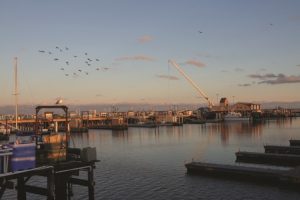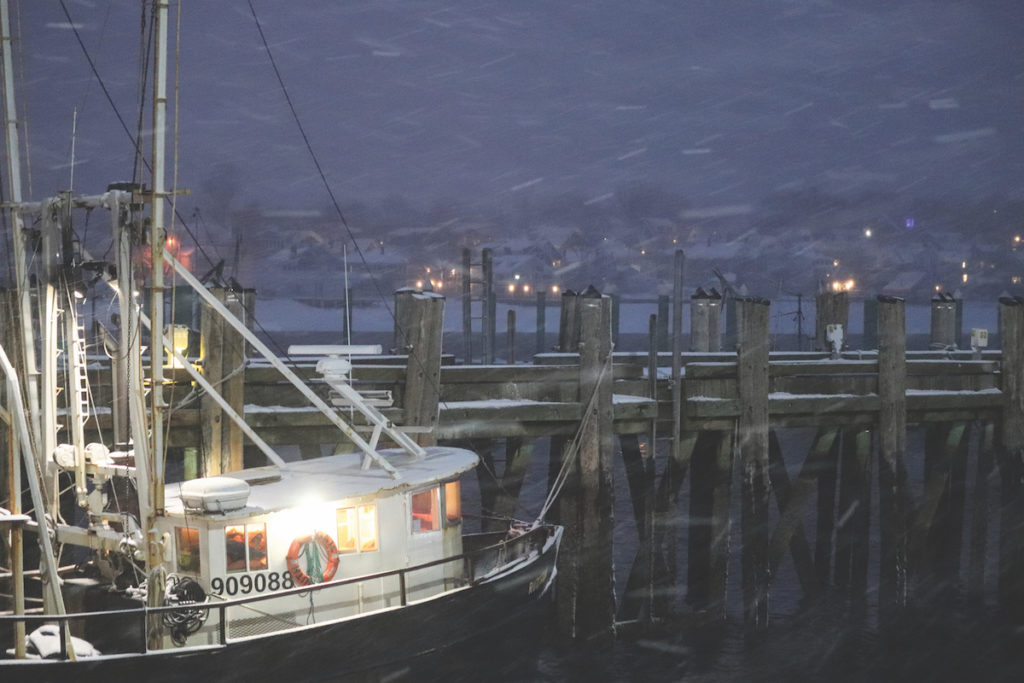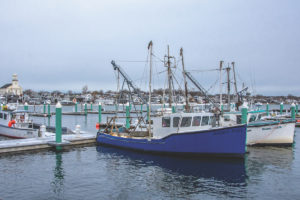PROVINCETOWN — Twenty years after an $18-million reconstruction, MacMillan Pier — the town’s economic and cultural heart — needs work. All agree on that. What is disputed is who should pay for it.
“We have competing goals,” said Jamie Staniscia, chair of the Provincetown Public Pier Corp. “Fishermen want low rates. The select board wants to cater to its constituents. And the Pier Corp. wants to carry out their mandate, as outlined by the state.”

The Pier Corp. has operated MacMillan Pier for the past two decades under an agreement that enabled the town to receive a $14.3-million state grant for the last renovation. It was created by the Commonwealth “for the purpose of bringing sound and market-based management practices to MacMillan Pier operations,” according to the enabling act of 2000 that established the Pier Corp.
But lobsterman Dana Pazolt sees the 21-year-old public corporation “trying to beat up tenants to drive the fishermen out. They want to put a bunch of pleasure craft there.”
The pier’s fiscal 2022 draft budget, unanimously endorsed by the Pier Corp. board on Dec. 2, includes controversial rate increases that will go into effect this coming April. Dockage rates will go up by about 50 percent. While the Pier Corp. board originally voted to raise rates in February 2021 (to go into effect in April 2021), the resulting public outcry led to postponing the increases for a year, as fishermen regained their footing amid the effects of the Covid-19 pandemic.
The budget’s projected revenue for the coming year is $997,799 with the planned rate increases. That budget is 32 percent higher than the revised fiscal 2019 budget. The fiscal 2023 budget is projected to jump by another 11 percent.
“This is a good budget,” said Pier Corp. board member and treasurer David Colton during the Dec. 2 meeting. “The budget wouldn’t have been possible without rate adjustments.” The budget will be presented to the select board.
The life of the pier is 40 to 50 years, said Pier Manager Doug Boulanger. Needed repairs include a cracked water line, rusting electrical switches and gears, and other structural repairs, like replacing pilings and broken ladders, said Boulanger.
At the last annual town meeting, voters approved $270,000 in electrical upgrades and infrastructure maintenance like the failed pilings. The plan is to cover essential repairs with town meeting appropriations over several years, according to Boulanger.
Past and present Pier Corp. members say dockage rate increases are needed because there have been none since 2005, and taxpayers are continually subsidizing pier users who aren’t Provincetown residents. Only four of the 54 MacMillan slips are currently occupied by Provincetown residents, Staniscia said.
“The select board caves to political pressure from nonvoting nonresident tenants,” said Staniscia. “That is unfair to Provincetown taxpayers.”
But the tenants — commercial fishermen, whale watch boat owners, and ferry companies — say that the current plan is not feasible and ignores a core mission of the pier: to support and sustain the commercial fishing industry.
“Rate hikes will push more fishermen out of an already struggling industry and will also stop newcomers,” said third-generation lobsterman David Young, who now lives in Eastham. His family moved as the cost of living in Provincetown rose. “For any young person coming up,” he said, “it’s going to be a hard challenge. My son will not begin next year because he can’t afford it.”
A reasonable rate increase should be implemented, said fisherman and Pier Corp. member Beau Gribbin. “But 10 percent annually for five years,” he suggested, “instead of the drastic increase we’re seeing now.”
Rather than asking for fee increases, the Pier Corp. should pursue grant money, Pazolt said. “There are too many people calling the shots now and distracting the pier manager,” he said. “There is grant money out there. You just have to ask.”
Tenants say the Pier Corp. board has done a poor job managing pier maintenance, causing an increasing reliance on town funds.
Pier Corp. members attribute the pier’s failure to run independently to longstanding politics: proposed rate increases have always been met with objections about bad timing. “How can we sustain the pier if we can’t increase the rates?” Staniscia asked.
Young sees no need for the Pier Corp. to exist. “I’d rather deal with the selectmen myself,” he said. “Have it go back to the way it was, because we’re too far removed from the decision-makers. You go to the Pier Corp. with your grievance, and they must go to the selectmen. There are way too many players. I like one captain on the boat.”
Before there was a Pier Corp., the pier was run by the town. Maintenance was ignored for decades, and at length you could feel the structure move when a truck drove onto it, said former Town Manager Keith Bergman.
“We needed a business plan,” Bergman said. “The necessary funds weren’t being put aside for the pier, so it needed to be operated as a business. That’s where the Pier Corp. came along.”
In 2025, the lease between the Pier Corp. and the town will expire. “If people want a different option,” Staniscia said, “it’s up to the town to have an honest conversation with taxpayers about what their options are.”




 As of May 11, Provincetown had one confirmed active case of coronavirus, one death, and 26 additional cases considered recovered.
As of May 11, Provincetown had one confirmed active case of coronavirus, one death, and 26 additional cases considered recovered.